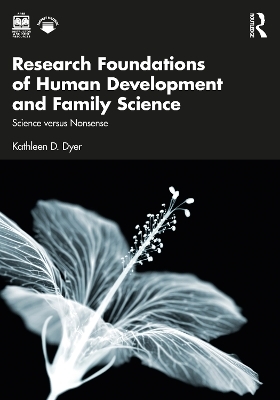
Research Foundations of Human Development and Family Science
Routledge (Verlag)
978-1-032-01557-6 (ISBN)
In Part I, Kathleen D. Dyer explores science. She distinguishes empirical scientific research from common sense and from knowledge gained from personal experience. This section also includes a discussion of the strategies used by pseudoscience to exploit the well-deserved credibility of science, providing relevant examples. Part II examines systematic empiricism through sampling and measurement. HDFS scholars use a wide array of measurement tools, including self-report (interviews, questionnaires, and self-report tasks), observations (participant, naturalistic, and structured), objective tests, physiological measures, and several types of archival records. Part III introduces the use of study design to achieve falsifiability in scientific research, including an overview of various orientations to time used in research as well as four different study designs: qualitative, prevalence, correlational, and experimental. Finally, Part IV addresses the public verifiability of science, including how scientific consensus is developed, the use of literature reviews to identify convergence of evidence, and how scientific literacy translates into evidence-based professional practice.
Illustrated throughout with studies foundational to the discipline as examples of the strategies described in the text, Research Foundations for Human Development and Family Science is a comprehensive, accessible core textbook for undergraduate research methods classes in HDFS. It introduces the discipline of HDFS and challenges students to understand the limitations of common sense and the threat of pseudoscience for those work professionally with children and families.
Kathleen D. Dyer is professor of child and family science at the California State University, Fresno. Her research is in the areas of parenting and infant sleep, as well as critical thinking in higher education.
Part I: Human Development and Family Science 1. Isn’t it Just Common Sense? Professional Expertise in HDFS 2. My Hairdresser’s Cousin’s Kid: Evidence from Personal Experiences 3. Skeptically Interrogating the Universe: Science as a Verb 4. Stealing the Good Name of Science: How Pseudoscience Fakes It Part II: Systematic Empiricism Through Sampling and Measurement 5. It Depends on Whom You Ask: Study Subjects and Sampling Issues 6. What Do You Mean by That? Conceptualizing the Variables 7. Tell Me How it Is: Self-Report Measures 8. Just Act Natural: Observational Measures 9. More Than One Way to Cook an Egg: Other Measurement Strategies Part III: Falsifiability Through Study Design 10. First Comes Love, Then Comes Marriage: Orientations to Time 11. What is That All About? Qualitative Designs to Produce Insight 12. How Often Does That Happen? Prevalence Research Designs to Describe Variables 13. Where There is Smoke, Is There Fire? Correlational Research Designs to Identify Relationships 14. We Just Want to Know if it Works: Experimental Designs to Determine Causation Part IV: Public Verifiability for Evidence-Based Practice 15. On the Shoulders of Giants: Convergence and Consensus 16. Scientific Literacy for Professional Practice in HDFS
| Erscheinungsdatum | 23.02.2022 |
|---|---|
| Zusatzinfo | 17 Line drawings, black and white; 4 Halftones, black and white; 21 Illustrations, black and white |
| Verlagsort | London |
| Sprache | englisch |
| Maße | 178 x 254 mm |
| Gewicht | 1220 g |
| Themenwelt | Geisteswissenschaften ► Psychologie ► Entwicklungspsychologie |
| Geisteswissenschaften ► Psychologie ► Familien- / Systemische Therapie | |
| ISBN-10 | 1-032-01557-8 / 1032015578 |
| ISBN-13 | 978-1-032-01557-6 / 9781032015576 |
| Zustand | Neuware |
| Informationen gemäß Produktsicherheitsverordnung (GPSR) | |
| Haben Sie eine Frage zum Produkt? |
aus dem Bereich


